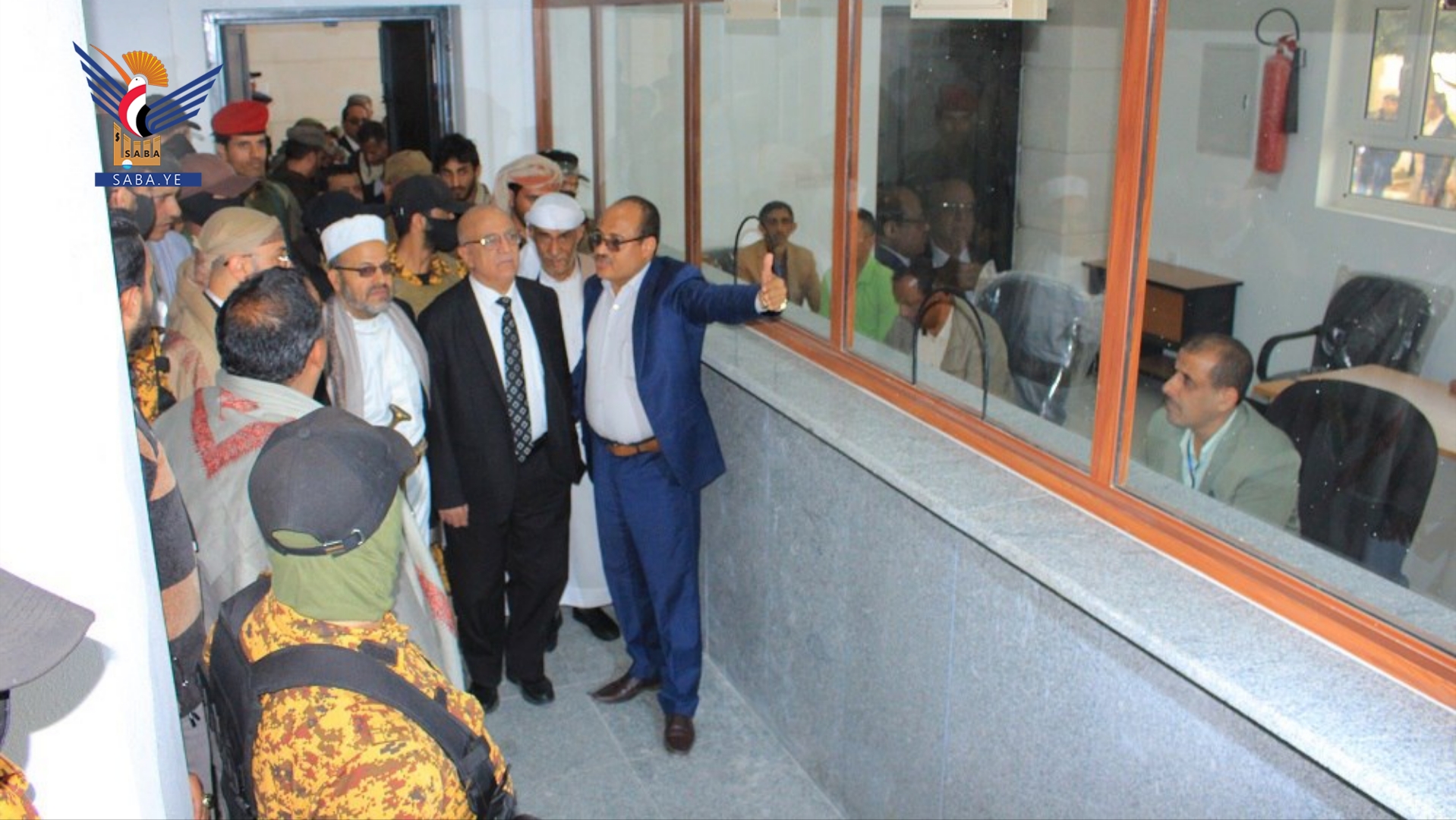Sana'a - Saba:
When the US, Saudi, and Emirati aggression against Yemen began more than ten years ago, specifically on March 26, 2015, the aggressor forces were betting that Yemen would collapse under the bombardment, blockade, and starvation, However, the Yemenis were not a piece of paper in the offices of international politicians, nor merely numbers in intelligence reports, Rather, they were a people who decided to make the aggression a turning point, not a point of collapse.
Despite the massacres and crimes committed by the aggression over the past ten years, which are shocking to humanity, and the devastation that has affected the infrastructure in every sector, this has not prevented the steadfast Yemeni people from shaking off the dust of destruction to continue their path of liberation and progress.
The Ministry of Justice and Human Rights, and the judiciary in general, were not immune to the aggression's targeting, which sought to spread chaos and deny justice to Yemenis. However, the efforts of those working in the judiciary, including the Ministry of Justice and Human Rights, and under the leadership of the leader of the revolution, Sayyed Abdulmalik Badr al-Din al-Houthi, and Mahdi al-Mashat, President of the Supreme Political Council, were able to transform the aggression's efforts from destruction to construction, and numerous achievements for the Yemeni judiciary are attested to by reality and the citizenry alike.
Despite the enormous challenges and exceptional circumstances resulting from the aggression on Yemen, the Ministry of Justice and Human Rights and its affiliated agencies achieved significant accomplishments (between 2015 and 2025), these accomplishments reflected the determination of the ministry's leaders and employees and their sense of responsibility in confronting the aggression, continuing judicial work, and ensuring access to justice for all citizens.
The Ministry of Justice and Human Rights achieved tangible achievements in various areas related to judicial work, space does not suffice to detail these achievements, but the most prominent ones are presented, according to the latest report issued by the ministry.
Automation and Networking
Over the past few years, the Ministry of Justice and Human Rights has worked tirelessly to implement a digital transformation strategy for the judiciary and modernize the judicial infrastructure.
These reforms aim to facilitate access to justice for litigants, expedite judicial procedures, and improve court efficiency, this is of particular importance to decision-makers at the senior management level in the judiciary, and to the state's senior management in general, this is particularly important within the framework of the general orientations of the revolutionary leadership and the Supreme Political Council toward judicial reforms aimed at adapting the judiciary to social, economic, and political developments.
To this end, the Ministry of Justice and Human Rights completed the networking of 204 appeal and first instance courts in 15 governorates, information centers were established in these courts by extending and operating a network consisting of network points, electricity, and the internet.
The Ministry has implemented numerous projects to modernize the judiciary's technical infrastructure by providing and installing computers, servers, printers, and other modern devices, as well as advanced networking equipment to ensure fast and secure connectivity between the courts and the main data center, enabling easy exchange of data and information. Furthermore, it has provided and installed security devices and solar energy systems for the main data center.
Among the most important projects implemented by the Ministry are the provision of the following equipment: 585 computers, 62 solar energy systems, seven central servers, 271 printers, 585 network hubs, two security devices, 280 network modems, 43 scanners, 62 fingerprint devices, 201 surveillance cameras, four network connection equipment, 20 antennas, 116 photocopiers, 23 display screens, four network connection equipment, a video conference device, and various maintenance equipment.
Regarding technical and software aspects, the Ministry of Justice and Human Rights has implemented a series of projects, most notably: creating and designing three websites: the Judicial Gazette website, the Journal of Judicial and Legal Research and Studies website, and the Higher Judicial Institute website, as well as updating the official website of the Ministry of Justice and Human Rights.
Technical and software work also included updating and developing five systems: the judicial system, personnel affairs, electronic fingerprinting, electronic transactions, and the trustees' system. The work also included creating and designing three new systems: the complaints and oversight system, the real estate documentation system, and the general documentation system.
This work included the creation of five Android applications, including the Ministry of Justice and Human Rights Services application, the judicial system mobile application, the notary and trustees' fees calculator application, the court assets application, and the personnel affairs mobile application.
The number of users on the ministry's private network reached 1,525 users in the ministry's general office and the courts, the number of users of the judicial system reached 862 users from the Judicial Inspection Authority, the ministry's general office, and the courts, the number of users of the information systems reached 1,067 users from the three entities.
Training and Qualification
Raising the efficiency of employees, honing their skills, and providing them with new skills and expertise is the cornerstone of the judicial reform process.
To this end, the leadership of the Ministry of Justice and Human Rights has placed great importance on training and qualification. It has conducted training courses, workshops, and scientific seminars, qualifying a large number of notaries and legal secretaries, as part of the state and government's efforts to reform notarization as the primary gateway to the judiciary.
Over the past ten years, the number of training and qualification courses and workshops has reached 151, benefiting 91,004 trainees from the judiciary, these courses were distributed among 103 courses, benefiting 6,220 trainees, and 48 workshops, benefiting 84,784 participants.
Documentation Data
The completion rate in the field of documentation reached 100 percent, with a total of 2,062,959 documentations. This figure includes 1,759,793 documentations in general primary courts, 101,683 in commercial courts, 200,898 in traffic courts, and 585 in real estate notary offices.
Workforce Planning
The Ministry of Justice and Human Rights issued 1,493 decisions in the field of workforce planning and meeting needs, targeting 8,421 individuals, these decisions included job rotations in the Ministry's offices and courts, redeployment of employees from the General Office to support the courts, contracting to meet urgent needs in the courts, particularly in the field of automation, settlement decisions based on qualifications and years of service, financial and administrative adjustments to the status of daily wage workers and court collaborators, and other types of decisions.
Oversight, Inspection, Follow-up, Evaluation, and Anti-Corruption
The Ministry of Justice and Human Rights attaches great importance to complaints and inquiries related to the judiciary, to this end, it has established two windows to receive complaints and inquiries, over the past ten years, 33,660 complaints and inquiries have been received.
The reception method was divided between two windows: the first, complaints received via the hotline, totaling 6,265 complaints, the second window, complaints and inquiries received via the Judiciary Operations Room, received 27,395 complaints and inquiries.
The Ministry took the necessary measures in response to these complaints, with the total number of employees referred for investigation reaching 1,401 from 2017 to March 2025.
The number of complaints referred to the Ministry's General Administration of Notarization reached 3,512, including 3,148 complaints against notaries, legal trustees, and impostors, and 364 complaints against legal trustees from the Criminal Investigation Department, the number of violations and forged documents reached 627, and 160 forged documents were filed against notary offices and courts.
Regarding complaints referred to the General Administration of Courts and Judicial Assistants, the number of complaints against court employees and judicial assistants reached 1,229, while the number of complaints referred to the General Administration of Specialized Courts reached 80.
The Ministry of Justice formed field committees, with a total of 163 committees, including 73 joint committees and 90 specialized committees.
Improving Administrative Performance
The Ministry of Justice and Human Rights has implemented numerous measures and issued decisions to develop and improve administrative performance over the past ten years of the aggression against Yemen.
Regarding notarization, the Ministry of Justice issued a number of decisions and took various measures, as follows: issuing 423 decisions to terminate and revoke the licenses of Sharia trustees; issuing 1,204 decisions to grant licenses to Sharia trustees; approving 3,333 vacant positions for trustees; conducting 473 job rotations for employees of notary offices and offices; investigating 2,877 complaints regarding notaries, trustees, and violations; printing 157 confidential seals for notary offices; and protecting the rights of children, women, and the needy.
The Ministry of Justice and Human Rights has contracted and commissioned a large number of lawyers and social experts to follow up on the cases of juveniles and indigent women in penal institutions, the number of lawyers and experts contracted and commissioned by the Ministry has reached 13,261 lawyers and social experts, including 9,095 lawyers contracted by the Ministry to plead in juvenile cases, 434 lawyers to plead in cases of indigent women, and 3,732 social experts in juvenile courts.
Court Requirements, Maintenance, and Renovations
Despite the aggression and blockade on Yemen, targeting the judiciary and its infrastructure, and despite the resulting scarcity of resources, the Ministry of Justice and Human Rights has achieved significant progress in providing court requirements, as well as the necessary maintenance and renovations for judicial buildings.
The Ministry established an internal workshop as a strategic option for furniture maintenance, thus achieving a vital step aimed at enhancing both operational and economic efficiency. The workshop performs periodic maintenance and necessary repairs quickly and effectively, preserving the quality of furniture and reducing the costs associated with replacement or external maintenance, the maintenance workshop has repaired and refurbished thousands of pieces of court furniture, saving significant amounts of money that would otherwise have been spent on repairs or the purchase of new furniture.
The total amount spent on renovating owned and rented courts and paying rents amounted to 2 billion, 551 million, and 1750 riyals over the ten years of aggression. This amount was distributed between 2 billion, 116 million, and 315 thousand riyals for rents for rented court buildings, and 434 million, 686 thousand riyals for renovations of court buildings.
New headquarters were also rented to replace buildings damaged by the aggression at a monthly cost of 18,783,000 riyals, bringing the total rental cost during the past period to 1,610,902,000 riyals.
The total amount spent on purchases, equipment, and publications to run the courts and the Ministry's office amounted to 1,857,061,000 riyals.
Judicial Publications
Judicial publications have witnessed a qualitative leap over the past ten years. The Ministry of Justice and Human Rights has printed millions of records, notebooks, books, files, papers, and other judicial publications, at a total cost of 632 million and 410 thousand riyals.
Given the numerous achievements of the Ministry of Justice and Human Rights, and the targeting it has been subjected to by the aggression over the past ten years, the Ministry has demonstrated the resolve and determination of Yemenis to overcome any obstacles and challenges, and even to use the aggression as a stepping stone to a better future.
What the Ministry of Justice and Human Rights has accomplished over the past ten years is a message to the world: those who bet on the fall of Yemen have lost their bet, those who thought Yemen would be defeated have misunderstood history, this land has never fallen, and it will never fall as long as it contains men who know nothing but victory.
M.M

| more of (Reports) |




